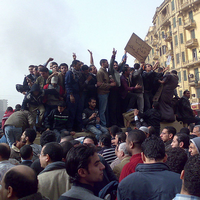The order that structured the Arab Middle East for the past several decades is now coming apart, giving way to a new power landscape in the region. The new topography of strength is still very much a work in progress, but it is not too early to ask which countries are emerging as the most powerful and influential.
This is a matter of importance not only to the states in the region. For centuries the Arab world has been the epicenter of regional and global struggles, and the ongoing changes it is currently undergoing pose a vital question for actors in an out of the oil-rich and strategically located region. The states most able to exert sway over their neighbors and leverage their resources and alliances to maximize their clout will be the ones whose friendship may prove most valuable -- and whose agenda outside powers will have to scrutinize most closely.
Understanding which Arab country is the most powerful requires looking at raw force -- military strength -- but also at soft power, or the ability to use cultural, political, economic and religious assets to pursue an agenda. The battle for ascendancy will pit the traditional forces of the region -- large resource-poor countries such as Egypt as well as vast oil-rich kingdoms such as Saudi Arabia -- against nimble, daring emirates like Qatar.

